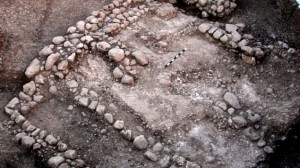Archeologists have found rare prehistoric sites including a 10,000-year old house, and a 6,000-year old temple. The findings were unearthed in Eshtaol, located about 17 miles west of Jerusalem, ahead of widening a highway. The building, almost all of which was found as reported by CNN, seems to have undergone renovations and repairs and represents a time when humans first began living in permanent settlements rather than migrating regularly in search of food. The team also found a cluster of abandoned flint and limestone axes nearby. The archeologists also discovered the remains of a temple built in the second half of the fifth millennium B.C., including a 4-foot-high stone column weighing several hundred kilograms.
The archeologists believe that these new findings show a very informative and broad picture of formation of early human civilization centers where thousands of years ago people first started domesticating animals and plants. The findings also provide evidence of how rural societies made the transition to urban societies in the early Bronze Age, about 5,000 years ago.
NBC reports that throughout Israel, construction projects often lead to new archaeological discoveries. For example, during recent expansions of Highway 1, the main road connecting Jerusalem and Tel Aviv, excavators discovered 9,500-year-old animal figurines, a carving of a phallus from the Stone Age and a ritual building from the First Temple era.
Eshtaolis in central Israel, and located about 27 kilometers from Jerusalem.
















